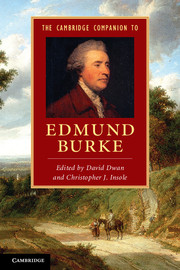Book contents
- Frontmatter
- Contents
- Contributors
- Acknowledgements
- Method of Citation
- Chronology
- Introduction Philosophy in Action
- 1 Burke’s Life
- 2 Burke, Enlightenment and Romanticism
- 3 Burke as Rhetorician and Orator
- 4 Burke’s Aesthetic Psychology
- 5 Burke on Law and Legal Theory
- 6 Burke on Political Economy
- 7 Burke and Religion
- 8 Burke and the Constitution
- 9 Burke and the Natural Law
- 10 Burke and Utility
- 11 Burke and the Ends of Empire
- 12 Burke and the American Crisis
- 13 Burke on India
- 14 Burke and Ireland
- 15 Reflections on the Revolution in France
- 16 Burke’s Counter-Revolutionary Writings
- 17 Burke in the United States
- Further Reading
- Index
- References
6 - Burke on Political Economy
Published online by Cambridge University Press: 05 December 2012
- Frontmatter
- Contents
- Contributors
- Acknowledgements
- Method of Citation
- Chronology
- Introduction Philosophy in Action
- 1 Burke’s Life
- 2 Burke, Enlightenment and Romanticism
- 3 Burke as Rhetorician and Orator
- 4 Burke’s Aesthetic Psychology
- 5 Burke on Law and Legal Theory
- 6 Burke on Political Economy
- 7 Burke and Religion
- 8 Burke and the Constitution
- 9 Burke and the Natural Law
- 10 Burke and Utility
- 11 Burke and the Ends of Empire
- 12 Burke and the American Crisis
- 13 Burke on India
- 14 Burke and Ireland
- 15 Reflections on the Revolution in France
- 16 Burke’s Counter-Revolutionary Writings
- 17 Burke in the United States
- Further Reading
- Index
- References
Summary
Burke’s Fears for the Future of Europe.
Scholars of Burke’s writings have sometimes seen his engagement with the French Revolution, towards the end of his life, to have been an ‘unkindness of fate’, on the grounds that a person ‘who has all his life surrounded himself with a mental paradise of order and equilibrium and belief’ was forced to confront its antithesis. Such an interpretation correlates with a view of the eighteenth century, and of Britain above any other country, as being characterised largely by equipoise, calm, and order. Burke was laying the foundations for Victorian self-confidence, and was on the side of progress in defining and defending the British constitution, and more particularly the manners it rested upon, as the great bastion against immoderation and excess, whether in the form of atheistic or democratical enthusiasm. Yet Burke’s fears about the future, and the future of Europe especially, antedated 1789. Like Gibbon too, he had long been worried about the instability of Europe, because of the gap between the military strength of small and large states, which rested in turn upon the economic ability of bigger states to exploit large markets and to create a public debt, on the basis of anticipated income from taxation, that provided revenues for war. Aspiring imperial powers, always likened to Rome, germinated in such soil, and explained events like the partition of Poland by Prussia, Russia, and Austria in 1772. The event had exercised Burke in a letter to the scion of a prominent Prussian family in 1774, and represented one of many laments for the prospects of Europe’s small states. Burke called Poland ‘but a breakfast’ (C, II: 512–14).
- Type
- Chapter
- Information
- The Cambridge Companion to Edmund Burke , pp. 80 - 91Publisher: Cambridge University PressPrint publication year: 2012
References
- 7
- Cited by

